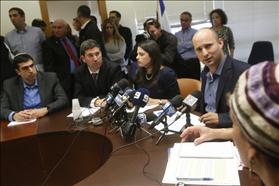There's no equality in sharing this burden
The Peri proposal for the Ultra-Orthodox Draft: Equality in Sharing the Burden, without the equality
Hiddush VP Shahar Ilan submitted a position paper to MKs, outlining the problematic aspects and areas for change in the Peri Commission's proposals for implementing the ultra-Orthodox draft.
14/07/2013 18:11
Tags: Equality in Sharing the Burden · IDF · Ultra-Orthodox draft · The Jewish Home · Ayelet Shaked · Peri Committee

Bayit Hayehudi party meeting, (R-L) Party chair Naftali Bennett, Ayelet Shaked. Photo credit: Miriam Alster/Flash90
Following the historic decision by Israel's Supreme Court in 2012 to annul the "Tal Law" which granted ultra-Orthodox men a blanket exemption from army service, the Knesset has focused on new legislation to implement a military draft for young men from the ultra-Orthodox sector. The Peri Committee was tasked with conducting research on the issue and providing recommendations to the lawmakers. To the great disappointment of virtually all sides of this topic, the committee's outline provides a short-sighted and ineffective proposal. If passed, this law will only increase tensions with the ultra-Orthodox public and diminish the chances of equality in national service.
Hiddush submitted a position paper written by Hiddush VP Shahar Ilan to MK Ayelet Shaked (Jewish Home Party), the Knesset member slated to chair the committee that will prepare the law proposal for equality in sharing the burden. Ilan has played an essential role advising several government committees on the ultra-Orthodox draft and has provided guidelines for better implementation based on his experience. In addition to MK Shaked, the paper was sent to all Knesset members to demonstrate the problematic aspects with the Peri Committee's proposals and provide suggested changes in order to draft a law that will effectively achieve its goals and ease tensions in the ultra-Orthodox community.
In order to clearly demonstrate the damaging effects that the Peri Committee's recommendations will have on the necessary efforts to promote equality in sharing the burden, Hiddush has highlighted the four most problematic aspects with the proposal and four additional proposals for change in the policy.
Problematic Aspects of the Knesset's proposal:
• The Peri Committee has proposed delaying draft implementation for another for years. This effectively leaves the next Knesset term with this task and could prevent the implementation of any draft whatsoever.
• There is no chance that the stated goals for number of draftees for the next four years will be achieved. This is due to the massive exemption that will be given to 11 drafts of yeshiva students (50,000 students in total) as well as the conflict with the ultra-Orthodox community that increasingly condemns army service.
Israel's lawmakers must take responsibility to draft up a law proposal that will not foil this important goal of bringing equality in national service because of careless mistakes."
• The current outline proposes imprisonment for students who refuse to enlist. Criminal sanctions for draft dodgers are not effective for the individuals in the ultra-Orthodox community. This proposed consequence is not pragmatic nor will it ensure that compulsory service is properly enforced.
• Deferring the draft age to 21 for yeshiva students is a massive blow to equality in national service and will make army service significantly less effective and more expensive for the government and the Israeli public.
Hiddush's suggested solutions:
• There must be immediate and gradual implementation of compulsory service. This should be carried out by re-evaluating by the planned number of draftees that the Peri Commission had decided on and by requiring economic sanctions against yeshiva students who refuse to serve.
• The planned criminal consequences against draft dodgers must be converted to economic sanctions. It is not realistic to expect the Israeli police force to successful imprison all draft dodgers from the ultra-Orthodox sector.
• The exemption age must be raised from 22 to 24. Only yeshiva students who are above the age of 26 on the day that the new law goes into effect should be granted an exemption from army service. (The current proposal exempts all ultra-Orthodox yeshiva students between the ages 18 and 24 when the law goes into effect).
• Yeshiva students, except for 1,800 elite and excelling Torah scholars, must be drafted at age 19.
Hiddush CEO Rabbi Uri Regev called on MK Shaked and her colleagues to take Hiddush's paper into account in order to "not waste this historic opportunity for equality in sharing the burden. There is no doubt that the MKs that proposed the "Equality in Sharing the Burden" Law had good intentions and that the law must be gradually implemented with concessions on both sides, but the Peri Committee's plan is setting itself up for complete failure. Israel's lawmakers must take responsibility to draft up a law proposal that will not foil this important goal of bringing equality in national service because of careless mistakes."